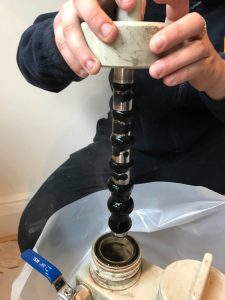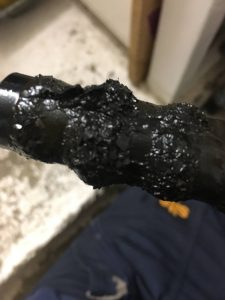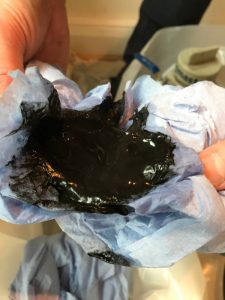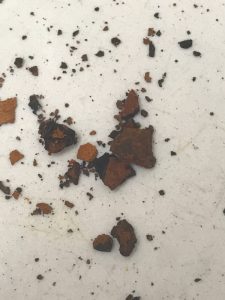You have no doubt turned on your heating by now as we have already been seeing some rather cold weather with more to come. Perhaps you have turned it on and found that it’s not heating up as well? Or maybe you vented it and found that it had some black-coloured water?
If you’ve never come across it before it’s a build-up of sludge. It’s not the end of the world if caught early, but it can lead to a bigger problem if you don’t deal with it now. It’s also something to keep in mind when you are having a new boiler and heating system installed, as you will need to put measures in place to prevent it from happening or your warranty may be void.
What is black sludge?
Sludge forms inside your central heating system due to a form of electrolytic corrosion. The water circulating through the system will react chemically with the system’s steel/copper components and begin to corrode them. The black iron oxide AKA sludge is the material created through this process which look like mud deposits and which will begin to circulate and settle through your system.
Why is it bad?
Black sludge will begin to build up inside your system and, left untreated, can cause serious problems to it, including:
- Blocking pipes
- Damaging radiators by causing leaks and pin holing
- Leading to boiler damage through cracking or blockages to the heat exchanger and other components
- Causing pump failure
- Leading to blockages of the heat exchangers in combi boilers causing problems with the supply of hot water
- Causing build of up hydrogen (which most people mistake for air) requiring regular bleeding
- Damaging seals and rubber diaphragms leading to leaks
- Higher heating bills due to your system being less efficient
What can I do if I suspect a black sludge problem?
Prevention is always better than cure, and a system powerflush will deal with the problem. If you are installing a new boiler or system make sure that a full powerflush is run first. This is done by a special machine, known as a ‘pumping station’ which will be attached to your system with the purpose of removing the dirty water and sludge and replacing them with clean water. The engineer will flush the system in both directions and if there are any particularly tricky spots they will spend time making sure they are cleared out too. Once that has been completed, the system will have a chemical inhibitor added whose purpose is to prevent future corrosion and black sludge build up.
The steps are the same for powerflushing an existing system, but if the corrosion is particularly aggressive it may require replacement parts and/or possibly repeated cleaning.
How do I avoid this happening again?
One way is for your system to have a chemical inhibitor added to it. This will either be done when installing a new heating system or during a powerflush to your existing one. It must be checked regularly and topped up as necessary as chemicals will and do break down over time.
Also there is a magnetic filter. Using its magnetic properties it will attract and capture iron oxide particles floating through the system preventing them from circulating further. Ideally this will be installed at the same time as a new boiler, but it can be retrofitted provided there is enough space next to your boiler.
Whichever method you choose, make sure that it is checked, cleaned, and topped up if necessary during your annual boiler servicing.
Need some help or advice?
If you think you may have sludge in your system call us at Platinum Plumbers and we will check and deal with it for you. You can reach us on 020 8855 0361 or by email at and we can get it sorted for you before winter truly sets in.





